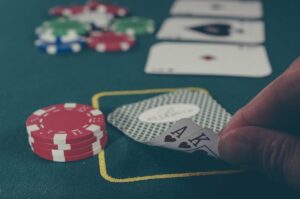 Our US online gambling regulation roundup takes a quick look at what has been happening in the early weeks of 2017, and where it is likely to lead.
Our US online gambling regulation roundup takes a quick look at what has been happening in the early weeks of 2017, and where it is likely to lead.
There has recently been a “blink-and-you-will-miss-it” period of legislation being introduced and meetings held relating to sports betting, Daily Fantasy Sports, and online gambling in general. To date, three states have introduced legislation to legalize sports betting, while there are already eleven sets of proposals supporting the regulation and taxation of Daily Fantasy Sports.
As our interest at USAFriendlyPokerSites.com is online poker, we are just going to focus on the bills relating to online poker and efforts that might lead to online poker legislation in the future.
We have also included some updates on states that attempted to regulate online poker in the past, but who have not yet introduced bills in 2017.
Proposals in Pennsylvania No Good for Online Poker
 Back in the first week of January, Senate Minority Leader Jay Costa published a Senate Co-Sponsorship Memoranda looking for colleagues to support his online gambling proposals. These proposals included very high licensing fees and tax rates that would make [geolink href=”https://www.usafriendlypokersites.com/high-taxes-will-eliminate-chances-online-poker-pa/”]online poker financially unfeasible[/geolink]. Costa has said that he intends to have legislation passed by March, but his proposals face plenty of opposition.
Back in the first week of January, Senate Minority Leader Jay Costa published a Senate Co-Sponsorship Memoranda looking for colleagues to support his online gambling proposals. These proposals included very high licensing fees and tax rates that would make [geolink href=”https://www.usafriendlypokersites.com/high-taxes-will-eliminate-chances-online-poker-pa/”]online poker financially unfeasible[/geolink]. Costa has said that he intends to have legislation passed by March, but his proposals face plenty of opposition.
One of his opponents – Senator Lisa Boscola – is supporting a bill that would [geolink href=”https://www.usafriendlypokersites.com/another-potential-spanner-works-pa-igaming/”]legalize video poker machines[/geolink] in bars and clubs. She claims there are more than 40,000 video poker machines already operating illegally throughout the state, and that the revenues from regulating and taxing the machines would generate more than double what could be collected from regulated online gambling.
Considering that last year´s efforts to regulate gambling were intended to fill a $100 million hole in the state budget, and – at the last minute – fix the local casino share tax issue, Boscola´s plans would resolve both these issues quickly and easily, without the need to worry about mobile gambling in airports or government departments putting their hands out for more money.
Is Massachusetts Ready for Online Gambling?
 [geolink href=”https://www.usafriendlypokersites.com/massachusetts/”]Massachusetts[/geolink] was the first state to introduce actual legislation related to online gambling this year. However, considering the effort put in last year by the Massachusetts Gaming Commission to create an omnibus bill encompassing all forms of sports betting, Daily Fantasy Sports and online gambling, it was no more than a [geolink href=”https://www.usafriendlypokersites.com/shell-igaming-bill-introduced-massachusetts/”]frankly disappointing shell bill[/geolink].
[geolink href=”https://www.usafriendlypokersites.com/massachusetts/”]Massachusetts[/geolink] was the first state to introduce actual legislation related to online gambling this year. However, considering the effort put in last year by the Massachusetts Gaming Commission to create an omnibus bill encompassing all forms of sports betting, Daily Fantasy Sports and online gambling, it was no more than a [geolink href=”https://www.usafriendlypokersites.com/shell-igaming-bill-introduced-massachusetts/”]frankly disappointing shell bill[/geolink].
Not everybody in Massachusetts is convinced the state is ready for online gambling. Attorney General Maura Healey and State Treasurer Deborah Goldberg are prepared to venture into the world of online lottery sales and Daily Fantasy Sports, but are conscious of a voter-rejected proposal for an expansion of gambling last November and the fact that two brick-and-mortar casinos are still under construction.
A number of influential politicians would like to wait until the two casinos are operating in 2018 and 2019 to see what effect they have on local communities, problem gambling and tax revenues. This would imply that, whatever measures eventually get included in Senator Bruce Tarr´s “Act Relative to Gaming”, they are unlikely to be enacted until 2020 or beyond.
Virginia Investigates Whether Poker is a Game of Skill
 Once regarded as one of the states least likely to authorize online gaming, the state of Virginia has made impressive headway towards entering the 21st Century. Last year it was among the first states to regulate Daily Fantasy Sports and, last week, a bill was introduced to classify poker as a game of skill to circumnavigate the state´s draconian anti-gambling laws.
Once regarded as one of the states least likely to authorize online gaming, the state of Virginia has made impressive headway towards entering the 21st Century. Last year it was among the first states to regulate Daily Fantasy Sports and, last week, a bill was introduced to classify poker as a game of skill to circumnavigate the state´s draconian anti-gambling laws.
Although there is a long way to go before the proposals to prescribe regulations and conditions under which [poker] tournaments are conducted
evolve into legislation to allow online poker, the Old Dominion State could be a dark horse and one to keep an eye on as the year progresses. However, don´t hold your breath on this one. The Senator responsible for introducing this bill has tried ten times before, and her proposals have never passed the committee stage.
Hawaii – a Long Shot, or a Serious Proposition?
 Hawaii and Utah are the only two states that expressly prohibit online gambling of any sort. Now Senator Will Espero wants to get rid of Hawaii´s “spoil-sport” image with a bill to regulate online casinos, online poker and an online lottery. The Senator is concerned about the
Hawaii and Utah are the only two states that expressly prohibit online gambling of any sort. Now Senator Will Espero wants to get rid of Hawaii´s “spoil-sport” image with a bill to regulate online casinos, online poker and an online lottery. The Senator is concerned about the tens of millions of dollars
that could be directed into the State´s coffers to help pay for education and the island´s infrastructure.
The Senator´s proposals were introduced last week, and includes the formation of s Hawaii Internet Lottery and Gaming Corporation to oversee the implementation of his proposals and regulate operators thereafter. As long shot´s go, you would have to give this one a chance. Hawaii was recently revealed to be the 27th most gambling addicted state in the US, and it could do with the money.
New Hampshire Tells It Like It Is
 The state of New Hampshire is not known for its poker achievements. The highest rated poker player from New Hampshire on the Hendon Mob database – Michael Drummond – doesn´t make the GPI top 1,000 players, and the state only has ten
The state of New Hampshire is not known for its poker achievements. The highest rated poker player from New Hampshire on the Hendon Mob database – Michael Drummond – doesn´t make the GPI top 1,000 players, and the state only has ten charitable gambling
establishments. However a new bill intends to exempt online gambling from the Granite State´s fairly stringent list of gambling offences.
Rather than fill the bill with licensing fees and conditions, HB 562 simply states that [unregulated] online gambling happens, that the Department of Justice does not investigate or prosecute offenders, and that allowing online gambling will not have any impact on revenues from the lottery or charitable gaming. The proposals to let´s just let this happen
– if enacted – will take force on 1 January 2018.
More Education Needed In Washington State
Although online gambling is a felony in the Evergreen State, a hearing of the Washington Senate Commerce Committee took place last week to discuss the regulation of Daily Fantasy Sports and online poker. According to those who presented testimony to the Committee, the online poker discussion was rushed and failed to address many of the concerns of those opposed to regulation.
Unfortunately, there was not much time given to fully discuss this issue. Lots of misinformation went unchecked. Hope there is another one.
— PokerPlayersAlliance (@ppapoker) January 18, 2017
What about the States Still to Introduce Legislation?
 Three states that made more progress than most towards the regulation of online poker last year were New York, Michigan and California. In New York, Assemblyman Gary Pretlow has indicated he is ready to push ahead with a revised online poker bill that should pass both legislative chambers. However, the problems that prevented passage of a bill in 2016 still remain – it will likely cost more to regulate online poker in New York than the state will receive in revenues, and the high licensing fees will likely dissuade many operators from participating in a market with a limited return.
Three states that made more progress than most towards the regulation of online poker last year were New York, Michigan and California. In New York, Assemblyman Gary Pretlow has indicated he is ready to push ahead with a revised online poker bill that should pass both legislative chambers. However, the problems that prevented passage of a bill in 2016 still remain – it will likely cost more to regulate online poker in New York than the state will receive in revenues, and the high licensing fees will likely dissuade many operators from participating in a market with a limited return.
Over in Michigan, Senator Mike Kowall has also indicated he is putting the finishing touches to a new bill. How he attempts to deal with the tribal gaming issue and an interpretation of the constitution that implies voter approval is required for an expansion of gambling, is not yet known. There are also doubts that the revenues raised by the regulation of online gambling in Michigan will cover the cost of policing the activity, or will pay for a yet-to-be-created Division of Internet Gaming.
It is fairly unusual for us to be approaching the end of January without at least one online gambling bill in California. Usually the flak has started flying before the Christmas decorations are taken down. Is it the calm before the storm? Or, are the issues concerning bad actors and horseracing subsidies too much for anybody to try and resolve? Probably the latter and, unless PokerStars withdraws from its attempts to enter the Californian market, there will unlikely be any progress towards regulation in 2017.
A Bleak Picture Made Worse by Possible Federal Intervention
Regardless of where you look (except for New Hampshire), the scenario seems to be the same. States initially ignore that unregulated online gambling exists. Once they acknowledge the facts, everybody wants a slice of the cake. Then legislators want to tax it so highly that it becomes unfeasible for players to continue playing at the sites. Ultimately poker players will start using VPNs to play at unregulated sites again in order to beat the games – undermining the objectives of regulation.
The above synopsis paints a pretty bleak picture for the prospects of regulating online gambling in the USA. However, if you listen to some glass-half-empty industry professionals, the prospects [geolink href=”https://www.usafriendlypokersites.com/overreaction-ag-elects-comments-online-poker/”]might even get worse[/geolink]. Two weeks ago, Attorney General Elect Jeff Sessions was hijacked during a Senate confirmation hearing by anti-gambling puppet Lindsay Graham, with a question about the Department of Justice´s 2011 interpretation of the Wire Act.
Admitting he was “shocked” by the interpretation at the time, Sessions said he would “revisit” the opinion and give his views on it after careful consideration. Quite a lot has happened since 2011 – including the regulation of online gambling in three states and multiple failed attempts to interfere at federal level. It seems unlikely that Sessions will need do anything to derail the regulation process – individual states seem capable of doing that themselves.



